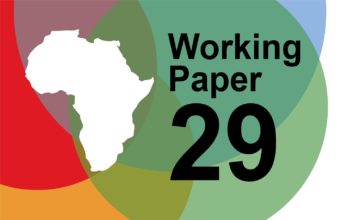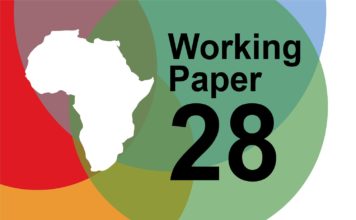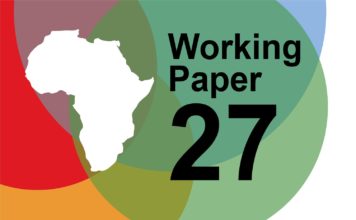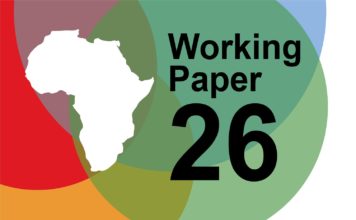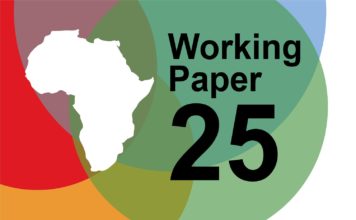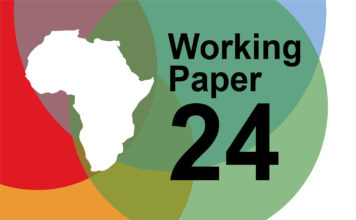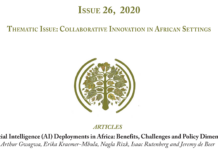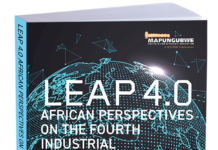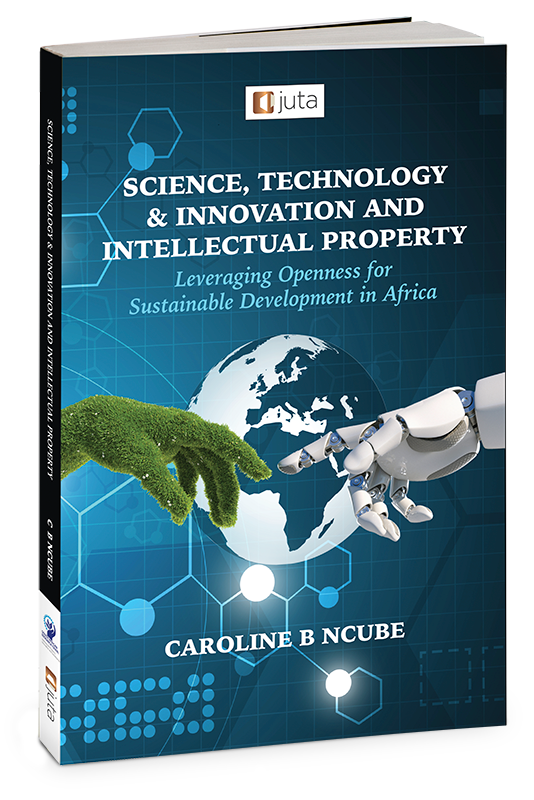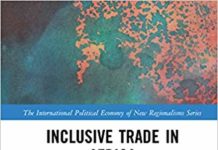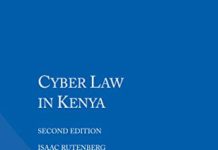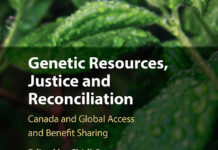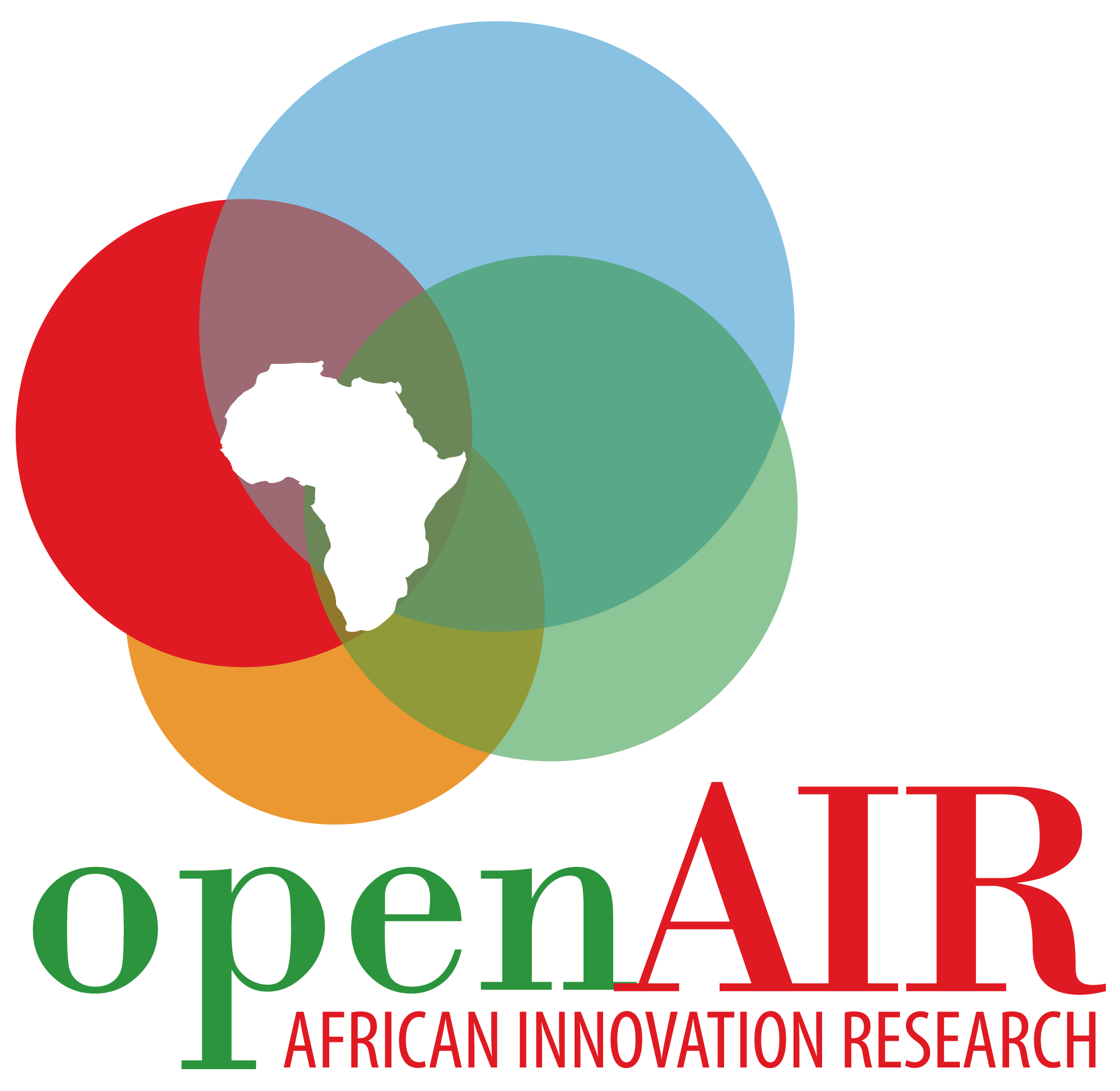ANNUAL REPORTS
Annual Report 2023-2024
This Open AIR Annual Report outlines the network's core activities in 2023-24 within our two main current initiatives: the Regulation for Innovation programme and...
History & Context
Knowledge and Innovation in Africa: Scenarios for the Future
This 2013 book is the product of three years of literature reviews, expert interviews and scenario-building exercises by the Open AIR network. The authors trace the contours of knowledge and innovation in Africa from the founding civilisations to today’s current realities, and then set out the drivers of change that can be expected to shape innovation systems on the continent between now and the year 2035.
Books
Innovation and Intellectual Property: Collaborative Dynamics in Africa
Editors: Jeremy de Beer, Chris Armstrong, Chidi Oguamanam and Tobias SchonwetterPublication Date: 2014Download: Innovation and Intellectual Property: Collaborative Dynamics in Africa (PDF, EPUB)
Innovation and Intellectual Property:...
Laws and Policies
Scaling Innovation: How Open Collaborative Models Help Scale Africa’s Knowledge-Based Enterprises
Drawing from more than 20 case studies of open, collaborative innovation in Africa, Open AIR has identified numerous dimensions of, and approaches to, enterprise-scaling. These case study findings are the core of Open AIR’s newest report, Scaling Innovation: How Open Collaborative Models Help Scale Africa s Knowledge-based Enterprises.
Publication
Regulation for Innovation: Conceptualising a Development Research Agenda for Inclusive and Sustainable Economies in Lower-Income Countries
This report scopes and builds towards a new research agenda on the regulation of innovation. Grounded in the findings of a 2021-22 Open AIR Scoping Study funded by the International Development Research Centre (IDRC), the report supports the development of a collaborative research programme to improve the regulation of innovations in priority areas including health, the digital economy, and clean technology.
Research
Open Opportunities for Globally Inclusive Biomedical Innovation
By Jeremy de Beer
See the Biomedical Innovation Project Archive Here:
Researchers from the Open African Innovation Research network, Open AIR, are investigating root regulatory causes of vaccine...
Annual Report
Annual Report 2023-2024
This Open AIR Annual Report outlines the network's core activities in 2023-24 within our two main current initiatives: the Regulation for Innovation programme and the Inclusive...
Laws and Policies
Fostering Information and Knowledge Access in the Digital Environment: A Situational Analysis of Legal-regulatory Frameworks in ARIPO Region
Principal Investigators:
A/Prof. Dick Kawooya, School of Information Science, University of South Carolina, USA, Kawooya@sc.edu
A/Prof. Tobias Schonwetter, Department of Commercial Law, University of Cape Town, South Africa,...
Blog Post
Researchers from the Award-Winning Open AIR Network Land Second $2.5M SSHRC Partnership Grant to Lead the Canada–Africa CAP on IP for Climate Action
Researchers from the Open African Innovation Research (Open AIR) network have been awarded $2.5 million CAD through the Social Sciences and Humanities Research Council’s Partnership Grants program to launch...
Blog Post
Open AIR Awarded CAD 750,000 to Transform Artificial Intelligence Related Intellectual Property Law and Policy in Africa
Researchers from the Open African Innovation Research (Open AIR) network have been awarded almost CAD 750,000 for a new three-year research project, Catalyzing AI’s Potential in Africa through Intellectual...
Blog Post
Appel à soumissions : Perspectives africaines sur la régulation de l’innovation
Le Réseau Open AIR est heureux d’annoncer un appel à soumissions pour un atelier international et une publication sur le thème de la régulation de l’innovation...
Blog Post
Police Power Doctrine and Security of Investment: Balancing Regulation with Innovation
By Dr. Otitodiri Ogadinma OnyemaQES Postdoctoral Fellow, Centre for Law, Open AIR
In October, 2025, I had the privilege of presenting my research at the International Conference on Science,...
Blog Post
Waiting for An Inclusive Pathogen Access And Benefit Sharing Policy
By Anthony Oguguo, QEScholar and PhD Student, Faculty of Law, University of Ottawa, Canada
The inadequacies of the global health law framework during the pandemic necessitated the...
From our YouTube channel: Afrinnovation

Distinguished Speaker Series: Untangling Traditional Knowledge at the United Nations
48:06

Modalities of Innovation hubs and innovative entrepreneurs in Africa
50:30

Distinguished Speaker Series: Prof. Dalindyebo Shabalala
01:05:57

Youth and the Maker Movement
01:58

Open AIR on Action Research and the Maker Movement
05:29

The Open AIR Partnership
02:48

Knowledge & Innovation in Africa - Scenarios for the Future
09:22

Innovation Linkages between Formal & Informal Sectors in Uganda
04:17
The African Journal of Information and Communication: Thematic Issue: Collaborative Innovation in African Settings
Produced in partnership with Open African Innovation Research (Open AIR), this AJIC Thematic Issue: Collaborative Innovation in African Settings features findings from research conducted by...
Leap 4.0 – African Perspectives on the Fourth Industrial Revolution
The 4IR is well established in many parts of the world, with technological advances driving profound social and economic change. However, for many developing countries, particularly countries in Africa, the 4IR may not offer the anticipated 'leap' forward.
This book seeks to identify the challenges and opportunities the 4IR presents to South Africa and the rest of the African continent, especially to workers and marginalised sectors of society.
Science, Technology & Innovation and Intellectual Property
2020 was an eventful year for the whole world, as a public health and economic crisis raged, bringing to the fore the perennial challenge of how to craft and use Intellectual Property (IP) institutions, law, policies and practices, collectively ‘IP frameworks’ to add to efforts to achieve sustainable development, and to consider recovery paths for economies. This coincided with intensified efforts to boost intra-African trade and enhance regional integration through the Agreement on the African Continental Free Trade Area (AfCFTA)and the entry of the US into negotiations for a bilateral FTA with Kenya. This book engages with this challenge in its six chapters.
Tensions Related to Openness in Researching Indigenous Peoples’ Knowledge Systems and Intellectual Property Rights
Contextualizing Openness: Situating Open Science
Edited by Leslie Chan
Angela Okune, Rebecca Hillyer, denise Albornoz, and Alejandro Possada
Published by Ottawa Press
Available online from the IDRC Canada.
CHAPTER...
Inclusive Trade in Africa: The African Continental Free Trade Area in comparative perspective
Four Open AIR Steering Committee members from two different hubs, authored a chapter on the new African Continetal Free Trade Area.
Contextualizing Openness
Contextualizing Openness , published by University of Ottawa Press and edited by Leslie Chan et al, offers a fascinating look at Open Science and...
The Cambridge Handbook of Copyright in Street Art and Graffiti
Tobias Schonwetter and Bram van Wiele contributed a chapter in The Cambridge Handbook of Copyright in Street Art and Graffiti, examining how South African...
Cyber Law in Kenya
Isaac Rutenberg’s publication co-authored with Michael Murungi, Cyber Law in Kenya (2nd edition), was published in March 2019. This book is a practical guide...
Human Rights, Digital Society and the Law
This book explores the main fundamental issues and practical dimensions related to the safeguarding of human rights in the internet, which are at the focus of current academic debates.
Genetic Resources, Justice and Reconciliation: Canada and Global Access and Benefit Sharing
Edited by: Chidi Oguamanam. When the oral history of a medicinal plant as a genetic resource is used to develop a blockbuster drug, how is the contribution of Indigenous Peoples recognized in research and commercialization? What other ethical, legal, and policy issues come into play? Is it accurate for countries to self-identify as users or providers of genetic resources?

